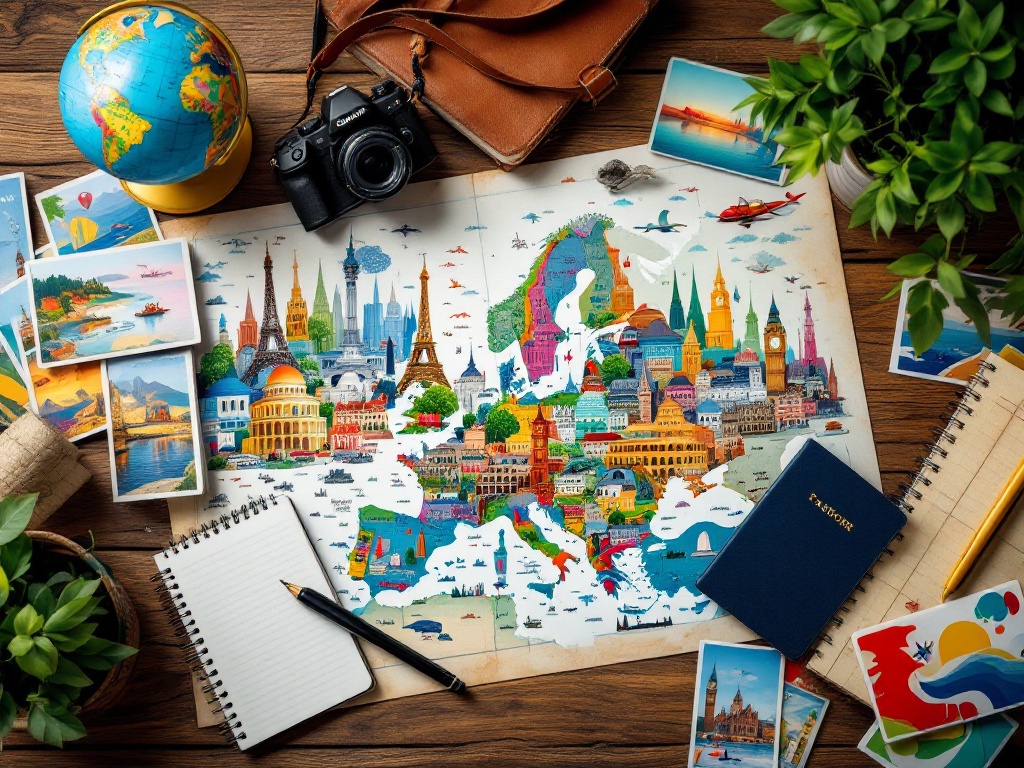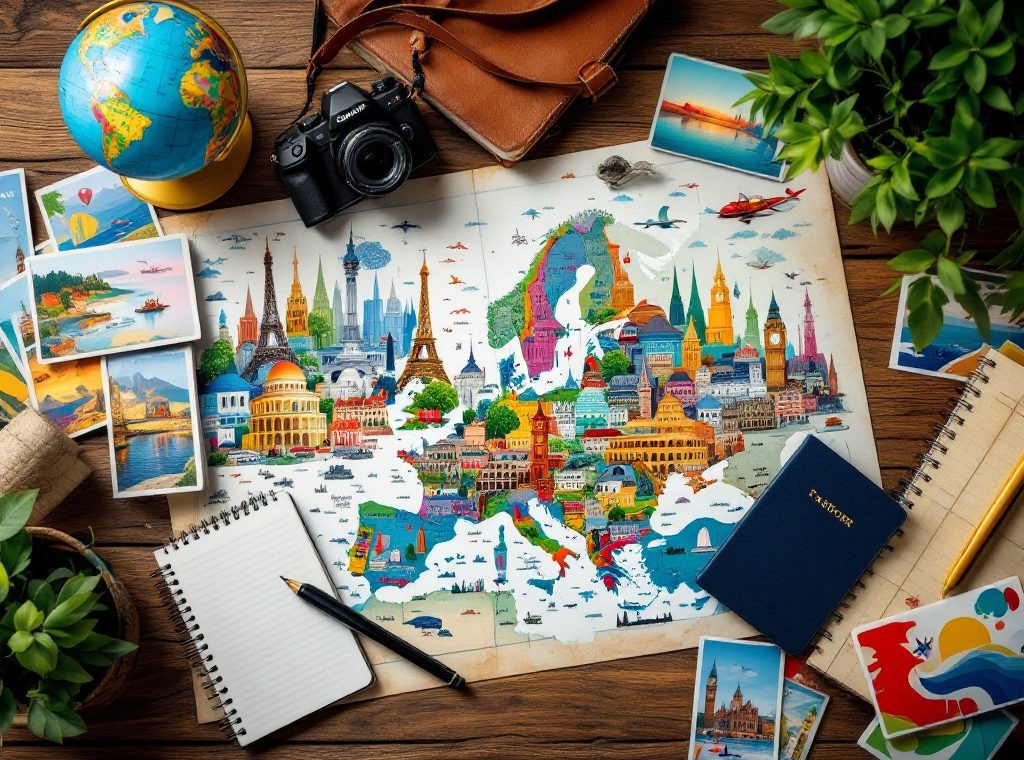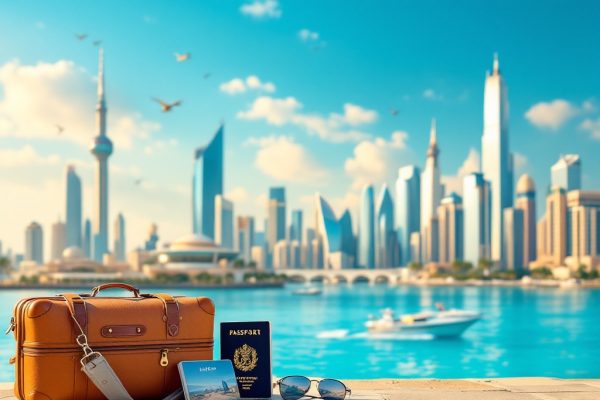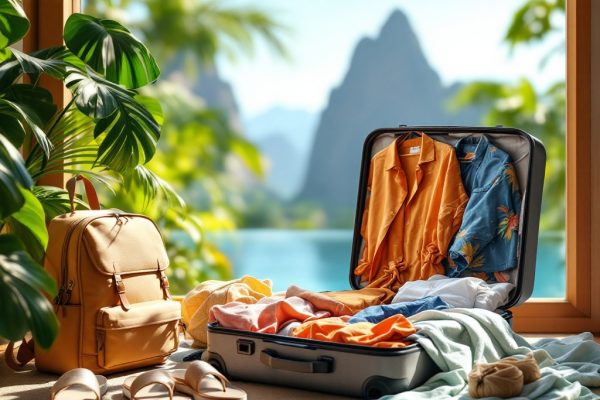Trip to Europe: How to Prepare
Dreaming of a European adventure? From iconic landmarks to hidden gems, Europe offers unforgettable experiences. This comprehensive guide covers everything from visa requirements and budgeting to packing tips and cultural etiquette. Discover how to plan your dream European trip, secure the best deals on flights and accommodation, and navigate local transportation like a pro. Start planning your European getaway today!
Important information

- Secure necessary documents like passport, visa (if needed), and travel insurance. Ensure your passport is valid for at least six months after your return date.
- Book flights and accommodation in advance, especially during peak season, for better deals and availability.
- Plan your itinerary but allow for flexibility and spontaneous exploration. Research local transportation options like rail passes or car rentals.
- Pack light with versatile clothing layers, essential electronics, chargers, adapters, and any necessary medications. Consider packing cubes for organization.
- Learn basic local phrases and research cultural customs to enhance your interactions and show respect.
Preparing for a Trip to Europe
Planning your European Adventure?
Research potential destinations. Explore diverse cultures, attractions, and local customs.
Establish a realistic budget. Factor in travel, accommodation, food, activities, and souvenirs.
Gather essential documents. This includes your passport, visas (if required), and travel insurance.
Book flights and accommodation. Secure bookings early for better deals.
Create a personalized itinerary. Include must-see sights but allow room for spontaneous exploration.
Pack strategically. Consider the climate and planned activities, opting for layered clothing.
Research local transportation. Explore options to save time and money.
Understand local costs. Research average prices to better manage your spending. Budgeting apps can be helpful.
Have a wonderful trip!
Essential Travel Documents
Planning a European adventure? Ensure smooth travels by packing these crucial documents:
Passport: its validity should extend six months beyond your return date.
Visas: depending on your nationality and destination, visas might be necessary.
Travel insurance: while recommended, bring your policy details if you have it.
Copies of essential paperwork: these include hotel and flight confirmations.
Schengen Area visa regulations: research the specific regulations for each country you plan to visit before you depart. This will prevent any surprises.
Travel Insurance and Health Coverage
Your current health plan may offer some coverage in Europe, but travel insurance is still strongly recommended. It safeguards you against unforeseen issues like medical emergencies, trip cancellations, or lost luggage, providing valuable peace of mind. Travel insurance offers broader protection than most health plans, covering expenses such as:
- Medical evacuations,
- Repatriation,
- Lost or stolen belongings.
It also offers trip interruption coverage, reimbursing you for non-refundable expenses if your trip is cut short. While your health plan might cover some medical costs abroad, it might not cover the full extent of expenses, especially in case of serious illness or injury. Travel insurance fills these gaps, ensuring you’re financially protected. Consider travel insurance an investment in your peace of mind, allowing you to travel worry-free.
Credit and Debit Card Preparations
Before your European trip, inform your bank and credit card providers of your travel dates to avoid transaction issues. Ensure your cards have chip-and-PIN technology, the standard in Europe. If your card lacks a PIN, contact your bank for assistance. Check your card agreements for foreign transaction fees, usually 1-3% per transaction. Consider a card that waives these fees for better savings.
Financial Preparations
Traveling internationally? Don’t forget to exchange some currency beforehand. Having local currency on hand covers immediate costs like transport and snacks when you arrive, plus it’s a safety net for unexpected situations.
Currency Exchange and Foreign Currency
Traveling abroad? Don’t forget to carry foreign currency for unforeseen costs. Many smaller businesses in Europe prefer cash transactions, so having some readily available is essential.
Understanding Tipping Culture
Researching local tipping customs can greatly enhance your travels. Understanding these practices demonstrates respect for local cultures and ensures smooth interactions with service providers. Here’s a structured approach:
Pre-Trip Research
Before you depart, consult online resources, travel guides, or even your hotel concierge to understand the tipping norms of your destination. This proactive approach prevents awkward situations and ensures you’re prepared.
Cash is King
While some establishments might accept tips via credit card, carrying small denominations of local currency is always recommended. This allows for greater flexibility and ensures the tip goes directly to the service provider.
Observe and Adapt
Pay attention to how locals handle tipping. This real-time observation can offer valuable insights and help you gauge appropriate amounts. Don’t hesitate to ask discreetly for clarification if needed.
Consider the Service
The quality of service should influence your tip. Exceptional service warrants a more generous tip, while subpar service might justify a smaller amount or no tip at all. Use your discretion.
Be Discreet and Respectful
When tipping, be discreet and avoid making a show of it. Hand the tip directly to the service provider or leave it on the table in a subtle manner. A simple “thank you” is always appreciated.
Transportation and Accommodation Planning
Planning international flights requires preparation. Secure your entry authorization (like a visa) early. Requirements vary by nationality and destination. Booking accommodations in advance is crucial, especially during peak season. This ensures you have a place to stay at popular destinations and hotels. Consider different options for local transportation. Rail passes are great for extensive, money-saving train travel. Car rentals offer flexible countryside exploration. The best option depends on your travel style and budget.
Entry Authorization
Secure your entry authorization (like a visa) early, as requirements vary based on your nationality and your destination.
Accommodation
Book your accommodations in advance, especially during peak season, to ensure availability at popular destinations and hotels.
Local Transportation
Rail passes: ideal for extensive train travel while saving money.
Car rentals: offer flexibility to explore the countryside at your own pace.
International Flights and Entry Authorization
Ensure your passport’s validity extends six months beyond your return date.
Visa requirements vary based on your citizenship and destination, so check those specifics.
If your European travels include multiple countries, familiarize yourself with the Schengen Area regulations.
Photocopy your passport and important travel documents, storing these copies securely.
Accommodation Reservations
Planning ahead and booking your accommodations in advance, especially during peak season, can help you secure the best selection and potentially find better prices. This ensures you’ll have the ideal stay you’re looking for.
Local Transportation: Rail Passes and Car Rentals
Planning extensive European train travel? A rail pass from Eurail or Interrail, offering unlimited journeys across numerous countries, might be your best bet. For shorter trips, however, individual tickets often prove more economical. While car rentals offer flexibility, factor in extra expenses like parking and tolls. Within cities, explore convenient public transport options such as buses, trams, and subways. Walking and cycling provide eco-friendly ways to discover hidden gems.
Travel options in Europe
- for extensive train travel, a rail pass from Eurail or Interrail might be the best option,
- for shorter trips, individual train tickets are often more economical,
- car rentals offer flexibility but come with added costs like parking and tolls.
Getting around in cities
- public transport like buses, trams, and subways offer convenient city travel,
- walking and cycling are eco-friendly ways to explore and discover hidden gems.
Packing for Europe
Pack smart for your trip by considering your itinerary, the weather forecast, and planned activities. This helps you avoid overpacking and ensures you have everything you need.
Packing List Essentials
Choose versatile clothing items that can be mixed and matched. Layering is key for fluctuating temperatures. Packing cubes can help maximize space and keep your suitcase organized.
Consider traveling with a carry-on suitcase to save on baggage fees and simplify your journey.
Gear Up for Any Situation
Pack a light jacket for unexpected weather changes. Comfortable shoes are essential for walking tours and exploring your destination. A travel umbrella is always a good idea to stay dry in case of rain.
Essential Electronics
- Phone and charger,
- Camera and charger,
- Laptop and charger.
Adapter and Power Bank
If traveling internationally, remember a universal adapter. A portable power bank will keep your devices charged on the go.
Creating a Packing List
Start with essential travel documents: passport, visa, and flight tickets. Don’t forget your driver’s license.
Pack clothing appropriate for the destination’s climate and planned activities. Versatile layers are recommended.
Comfortable walking shoes are essential.
Remember toiletries, medications, and a first-aid kit.
Pack necessary electronics, including chargers and adapters.
Finally, add any personal items for your comfort.
Packing Light and Efficient
Traveling light in Europe simplifies your trip. Consider the weather and your itinerary when planning what to pack, opting for versatile layers. Packing cubes are great for maximizing space and organization. A carry-on suitcase often suffices, eliminating checked bag fees. Remember essentials like chargers, toiletries, and medications. Leave some room for souvenirs. Here’s a helpful packing list:
- Versatile clothing layers.
- Packing cubes for organization.
- Chargers for your electronics.
- Toiletries and medications.
- Space for souvenirs.
Weather-Appropriate Clothing and Accessories
Pack clothing items that can be layered to ensure comfort and preparedness for varying weather conditions. Consulting the weather forecast will help you select appropriate attire. Don’t forget a travel umbrella for unexpected showers. For sun protection, sunglasses and a hat are recommended.
Essential Electronics and Outlet Adapters
Traveling to Europe? Ensure your electronics are compatible. European countries primarily use Type C, E, and F electrical outlets, distinct from North American Type A and B outlets. Type C and F outlets have two round prongs, with Type F also featuring grounding clips. Type E outlets resemble Type C but include a grounding pin. Since these are different from North American plugs, you’ll need adapters. A universal adapter is recommended for compatibility. Voltage is also crucial. Most modern electronics (phones, laptops, cameras, tablets) support dual voltage (110-240V), but older devices may need a voltage converter. Check your devices’ voltage requirements and pack accordingly to stay powered up during your travels.
North American Outlets
- Type A.
- Type B.
European Outlets
- Type C.
- Type E.
- Type F.
Don’t forget to check your device’s voltage and pack a universal adapter or voltage converter if needed.
Language and Cultural Considerations
Learning a few local phrases can greatly enhance your interactions and demonstrate respect for the culture. Researching customs and etiquette, such as dining practices and social greetings, is also beneficial, preventing misunderstandings and enriching your travel experience. This can make your trip much more meaningful.
Learning Basic Local Phrases
Learning key phrases significantly improves communication. Start with basics like “Hello,” “Thank you,” and “Excuse me.” Expand to useful phrases for ordering food, asking directions, and shopping. These phrases can simplify daily interactions. Language-learning apps are helpful resources for learning these phrases. Use them before and during your trip for a more enriching experience.
Researching Cultural Customs and Etiquette
Immerse yourself in the local culture by learning basic greetings, table manners, and dress codes. Understanding customs around photography and personal space is also crucial. Travel guides and online forums offer valuable insights that can enrich your experience and prevent misunderstandings, fostering deeper connections with the places you visit. Above all, remember to be respectful.
Enhancing Your Travel Experience
Pre-planning your activities and tours significantly enhances your travel experience. A daily plan ensures efficient time management, allowing you to explore more destinations. Booking tours in advance often leads to cost savings and guarantees your participation, especially during peak seasons.
Leverage technology, such as travel apps, to further optimize your trip. These apps provide valuable tools for navigation, translation, and currency conversion, plus recommendations for local dining and attractions.
Staying informed about the weather forecast and local news is also crucial. This awareness enables you to adapt to unforeseen circumstances. Checking weather updates helps you pack appropriate clothing and select suitable activities.
Local news keeps you abreast of events, festivals, and potential travel disruptions, like sudden road closures, allowing you to adjust your itinerary promptly. Furthermore, local news can highlight enriching cultural experiences you might not otherwise discover.
Planning Activities and Tours
Planning your daily activities and tours is key to maximizing your trip. Guided tours offer a hassle-free exploration experience, while independent exploration allows for a more personalized journey. Research key attractions beforehand and allocate enough time for each, factoring in travel time. Prioritize locations that align with your interests. For example, history enthusiasts might focus on historical sites. Don’t forget to embrace spontaneity; a flexible itinerary allows for unexpected discoveries.
Using Technology: Apps for Travelers
Travel apps can significantly improve your trips. For navigation, apps like Google Maps and Citymapper offer real-time traffic updates and public transport information, simplifying getting around. Translation apps, such as Google Translate and Duolingo, break down language barriers, making communication easier. When booking accommodations, flights, and tours, travel planning apps like TripAdvisor and Booking.com are invaluable. Because internet access can be unreliable, downloading offline maps and language resources in advance is recommended. Many apps offer specialized information and services for specific cities or regions, further enriching your travel experience.
Navigation
- Google Maps: provides real-time traffic updates and public transport information,
- Citymapper: offers detailed public transit routes and schedules.
Translation
- Google Translate: translates text, speech, and images between languages,
- Duolingo: offers language learning courses and translation tools.
Travel Planning
- TripAdvisor: provides reviews, ratings, and booking options for accommodations, flights, and tours,
- Booking.com: offers a wide selection of hotels, apartments, and other accommodations.
Offline Resources
Download offline maps and language resources beforehand for areas with unreliable internet access.
Staying Informed: Weather Forecasts and News
Before and during your trip, monitor weather forecasts from trusted sources such as AccuWeather, BBC Weather, or local meteorological agencies. Pack suitable clothing based on these forecasts.
Stay informed about news related to your destinations, including local events, transportation disruptions, and safety advisories. Valuable information can be found from reputable international news outlets like the Associated Press, Reuters, and BBC News, as well as local news sources at your destination.







